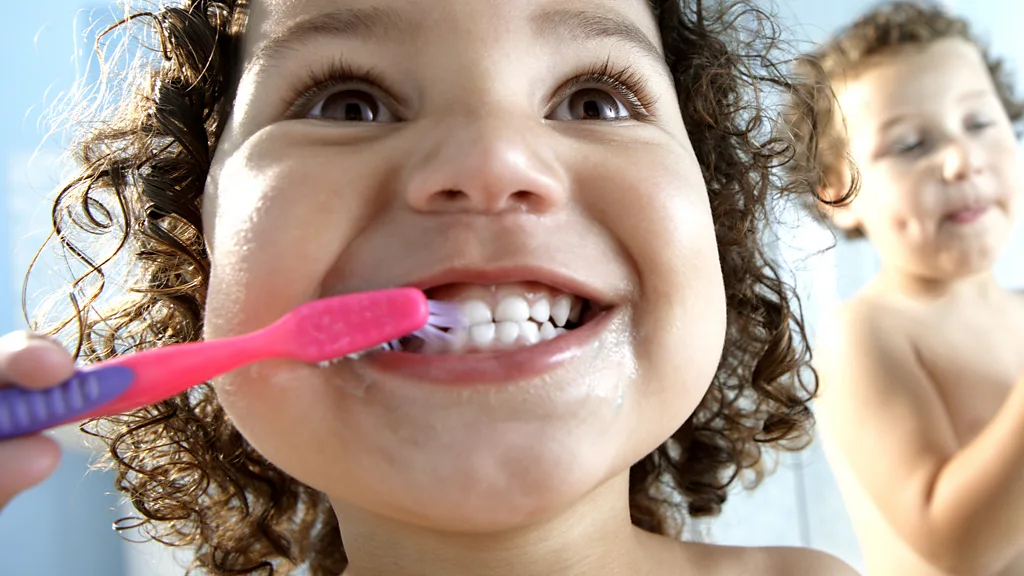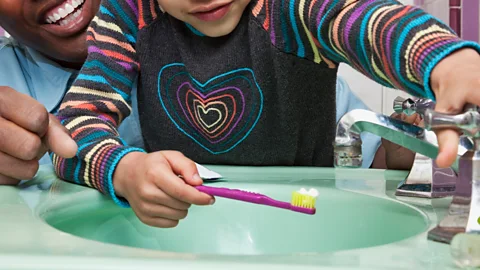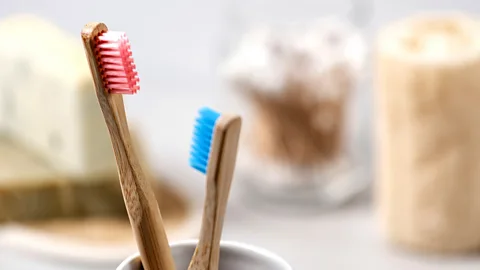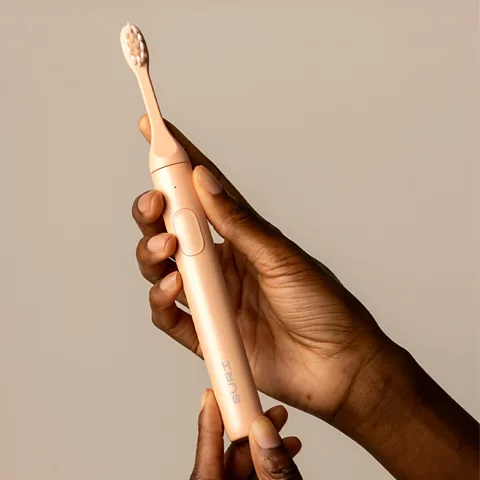Bamboo versus electric toothbrush: Which is the more sustainable?

Billions of toothbrushes are discarded every year. How can we brush our teeth in a more environmentally friendly way?
When I used to work in an office, I'd keep a manual, plastic toothbrush in my desk drawer. My colleagues would laugh as I diligently made my way to the bathroom, toothbrush in hand, every afternoon after lunch. At home, I had an electric toothbrush. I've always looked after my teeth, but ask me about my chosen toothbrush brand, about its material composition or its environmental impact, and I couldn't tell you. My relationship with my toothbrush was disposable and limited to its ability to clean my teeth. I doubt I was alone.
People should replace their toothbrushes every three to four months or more often if the bristles are frayed, according to The American Dental Association.
Given the toothbrush's ubiquity (billions are used and discarded every year), a group of academics from University College London (UCL) Eastman Dental Institute and Trinity College Dublin recently published a joint report to compare the sustainability of different types of toothbrushes. They compared plastic manual, plastic manual with replaceable heads, bamboo, and electric – using a life-cycle assessment (LCA) to consider all aspects of a toothbrush's "life", from creation to disposal.
 Billions of toothbrushes are used and discarded every year (Credit: Getty Images)
Billions of toothbrushes are used and discarded every year (Credit: Getty Images)The fossil fuel-derived plastic polypropylene, used to make both types of plastic brushes, had the single biggest impact on the environment when it came to the LCA of the brushes. In its Global Plastics Outlook, the Organisation for Economic Cooperation and Development (OECD) estimates that around 380 million tonnes of plastic waste is produced globally each year, of which 43 million tonnes comes from consumer products. And roughly 14 million tonnes of this, or 3.7% of total plastic waste, is made of polypropylene.
As for the electric toothbrush, its environmental impact was 11 times greater than the bamboo toothbrush, according to the LCA. It performed the worst in all but one category (water scarcity) and the greatest contributor to its overall environmental impact was transport (due to being heavier).
But if the electric brush came last, which brush topped the table? Oral hygiene was taken out of the equation, with both the report and the NHS claiming there is no evidence that any type of toothbrush is more clinically effective for the prevention of cavities and tooth decay, although electric brushes are more effective at removing plaque – partly down to technique, the in-built timing device and more agile heads. (Read more about How to properly brush your teeth in this article by Martha Henriques).
Bamboo brushes
The UCL and Trinity College study showed that plastic manual toothbrushes with replaceable heads came top, very closely followed by bamboo. You might find it surprising that plastic toothbrushes – even those with replaceable heads – are more sustainable than bamboo ones, given that bamboo grows quickly in otherwise challenging conditions and is a natural carbon sink.
"Bamboo toothbrushes may stop land from being put to better use such as increasing biodiversity, or in growing trees to offset carbon emissions," co-author Paul Ashley, professor of paediatric dentistry at UCL says of the findings. "It is therefore not necessarily the best option for the environment as popularly believed. Though it's important to note that its [climate impact] is still much lower than conventional and electric toothbrushes."

Patrick Verkland, chief executive of The Humble Co., a Swedish company which makes bamboo and plant-based toothbrushes, says that by working closely with suppliers, they ensure that their bamboo is grown in a way that respects the surrounding ecosystem and does not encroach on land critical for biodiversity or food production.
"Bamboo's biodegradability sets it apart as a material for toothbrushes, as it decomposes naturally when disposed of properly," Verkland says. "In contrast, most plastic toothbrushes persist in the environment for centuries if not fully recycled – a process that remains a huge challenge on a large scale."
Approximately 60% of The Humble Co.'s toothbrush handles are 100% plant-based (the plan is for all handles to be fully plant-based within the next 12 months). The rest feature a small amount of plastic, while bristles are made from nylon, a plastic component that the company is looking to replace with alternatives, which it is currently researching, Verkland says.
While trying to design a sustainable electric toothbrush, Gyve Safavi, founder and chief executive of electric toothbrush company Suri, based in the UK, came across a problem. He was researching the possibility of recycling replaceable plastic toothbrush heads and when he spoke to different recycling streams in the UK, they told him that "the heads can be recycled but they are too small for them to process, so they don't".
Safavi encountered the same hurdle when looking for manufacturers that could create a toothbrush handle that could be opened up by users. They were initially incredulous, confused as to why he'd want a toothbrush that could be repaired.
But he found solutions to both problems. Suri's toothbrush heads are made from cornstarch and its bristles from castor oil. Customers can send used heads back to Suri in a prepaid envelope to be recycled. The brand will also take back all brushes at end-of-life. "We designed our brush [with a battery] that lasts two to three times longer than most conventional electric toothbrushes on a single charge. This means it needs to be charged less frequently which significantly extends the overall battery life, and therefore the lifespan of the toothbrush," says Safavi. "We take them apart and we salvage all the materials we can. Batteries cannot be reused, but we can recycle them to the best raw components possible." According to a report in UK consumer champion magazine Which?, Suri "seems leaps ahead of others on the market when it comes to its green credentials".
Sophie Thomas, a circular design expert and visiting professor at the Royal Academy of Engineering, UCL, says that "the Suri rechargeable electric toothbrush is definitely a step in the right direction, with better charging, repair services – a great way to understand common fails in these products – and a send back recycling scheme for the heads".
"The carbon impact for any electric toothbrush is predominantly embedded in the materials of the motor and battery so the longer these can work and be repaired the better," she says.
In their current plastic form, toothbrushes will never get into the recycling system at scale, Thomas adds. On average, she says, a plastic toothbrush is made up of four types of co-moulded polymers that cannot be recycled in the same stream.
"Recycling is always about economics," she explains. "Toothbrush handles are made from HDPEs (High Density Polyethylene), which are so cheap that they have no value. We need to move away from our reliance on plastic and find genuine alternatives for single use and short life products. Bamboo and plant-based materials are a positive step away from the plastic status quo. We should also be looking at the potential of waste streams to create new materials."
Brett Duane, associate professor in Public Dental Health at Trinity College, and lead researcher of the report, says that even recycled plastic is problematic, pointing to a 2023 study which found that 13% ends up as microplastics in wastewater after the recycling process. "We need a product [made from materials that] can be grown naturally and then recycled repeatedly to allow land to be used for other purposes, so recycling of non fossil fuel products is the way forward," he says. "I think there are still significant problems with recycling plastic." (Read more about what can and can't be recycled).

At my local supermarket, staring at the shelves filled with toothbrushes, there were no electric versions making environmental claims and only the Ordo Sonic Lite (£35, $45) competed with Suri (£75, $97) on design. As for manual brushes, the two brands that stood out among the majority of plastic products were The Humble Co., which offered two brushes for £3 ($3.9) with a handle made from a mix of plant-based materials and polypropylene, with nylon bristles. Another option featured a "100% biodegradable sustainably grown bamboo" handle and nylon bristles for £4 ($5.20). For £6.95 ($9), TePe Choice offered a manual brush with reusable wooden handle, replaceable plant-based heads and bristles made from castor oil – and "80% less plastic waste". I decide to try the latter because of its reusable handle with replaceable heads (the type of brush that topped the study) but without all the plastic, and I was pleased with the results.
I would now struggle to justify buying any plastic toothbrush – even one with replaceable heads – when there are much better options on the market. Granted, some scrutiny on the consumer's part is needed, such as checking the credentials of the bamboo or other non fossil fuel material.
Even the authors of the UCL and Trinity College report conceded that, since they started their study, new toothbrush materials have come to market and, as such, further research is now needed. They highlighted electric toothbrushes with aluminium, rather than plastic, handles as the next generation of electric brushes. Aside from its renewable materials and recycling capabilities, what struck me about the Suri toothbrush was the thoughtful design. With its slim aluminium body, it is a third of the size of a standard electric toothbrush. And even bamboo toothbrushes look better than plastic ones. Perhaps if more brands put more care into their toothbrushes – from rejecting the fossil fuels status quo in favour of better materials to creating a desirable product – then more consumers would assign value to them, rather than see toothbrushes as the disposable items they are so often designed to be. I certainly will.
Source: BBC
























































